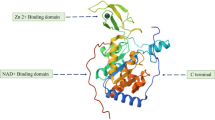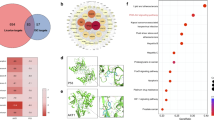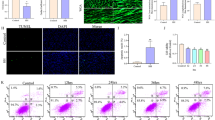Abstract
The present study aimed to elucidate whether L-carnitine (LC) protected H9c2 cells and its underlying mechanisms. Cell counting kit-8 (CCK-8) assay was used to evaluate cell viability. Apoptosis, cell morphology, and lactate dehydrogenase (LDH) assessment were used to prove effects of lipopolysaccharide (LPS) and LC on H9c2 cells. RT-qPCR and western blot assays were hired to evaluate the mRNA and protein expression levels, respectively. ELISA assay was performed to determine the released protein levels. Reactive oxygen species (ROS) level was evaluated by immunofluorescence and flow cytometry. LC was revealed to protect H9c2 cells against LPS-induced injury as indicated by increased cell viability, reduced apoptosis ratio and LDH level. LC treatment also reduced BAX expression as well as up-regulated Bcl-2 expression under LPS treatment. Mechanically, LC reduced oxidative stress and ameliorated the mitochondrial injury through modulating extracellular signal-regulated kinase 1/2 and c-Jun N-terminal protein kinase c-Jun N-terminal protein kinase phosphorylation levels as indicated by decreased membrane potential, increased ATP production and mtDNA expression. We found that LC ameliorates LPS-induced cardiomyocyte injury by abrogating cell apoptosis ratio, ROS levels, as well as mitochondrial dysfunction via mitogen-activated protein kinase signaling. Our findings revealed a potential drug for sepsis or LPS-induced cardiomyocyte injury.





Similar content being viewed by others
References
Deutschman, C. S., & Tracey, K. J. (2014). Sepsis: Current dogma and new perspectives. Immunity, 40, 463–475.
van Engelen, T. S. R., Wiersinga, W. J., Scicluna, B. P., & van der Poll, T. (2018). Biomarkers in sepsis. Critical Care Clinics, 34, 139–152.
Sato, R., & Nasu, M. (2015). A review of sepsis-induced cardiomyopathy. Journal of Intensive Care, 3, 48.
Li, N., Zhou, H., Wu, H., Wu, Q., Duan, M., Deng, W., & Tang, Q. (2019). STING-IRF3 contributes to lipopolysaccharide-induced cardiac dysfunction, inflammation, apoptosis and pyroptosis by activating NLRP3. Redox Biology, 24, 101215.
Rocca, C., De Bartolo, A., Grande, F., Rizzuti, B., Pasqua, T., Giordano, F., Granieri, M. C., Occhiuzzi, M. A., Garofalo, A., Amodio, N., Cerra, M. C., Schneider, F., Panno, M. L., Metz-Boutigue, M. H., & Angelone, T. (2021). Cateslytin abrogates lipopolysaccharide-induced cardiomyocyte injury by reducing inflammation and oxidative stress through toll like receptor 4 interaction. International Immunopharmacology, 94, 107487.
Okuhara, Y., Yokoe, S., Iwasaku, T., Eguchi, A., Nishimura, K., Li, W., Oboshi, M., Naito, Y., Mano, T., Asahi, M., Okamura, H., Masuyama, T., & Hirotani, S. (2017). Interleukin-18 gene deletion protects against sepsis-induced cardiac dysfunction by inhibiting PP2A activity. International Journal of Cardiology, 243, 396–403.
Liu, Y., Yang, W., Sun, X., Xie, L., Yang, Y., Sang, M., & Jiao, R. (2019). SS31 Ameliorates sepsis-induced heart injury by inhibiting oxidative stress and inflammation. Inflammation, 42, 2170–2180.
Liu, M., Zhang, Y., Cao, X., Shi, T., & Yan, Y. (2022). miR-197 participates in lipopolysaccharide-induced cardiomyocyte injury by modulating SIRT1. Cardiology Research and Practice, 2022, 7687154.
Zhang, Y., Xu, X., Ceylan-Isik, A. F., Dong, M., Pei, Z., Li, Y., & Ren, J. (2014). Ablation of Akt2 protects against lipopolysaccharide-induced cardiac dysfunction: Role of Akt ubiquitination E3 ligase TRAF6. Journal of Molecular and Cellular Cardiology, 74, 76–87.
Zhu, Z., Zhang, G., Li, D., Yin, X., & Wang, T. (2022). Silencing of specificity protein 1 protects H9c2 cells against lipopolysaccharide-induced injury via binding to the promoter of chemokine CXC receptor 4 and suppressing NF-κB signaling. Bioengineered, 13, 3395–3409.
Liang, Z., Pan, F., Yang, Z., Wang, M., Hu, C., Shi, L., Ji, Q., & Liu, L. (2021). Interleukin-9 deficiency affects lipopolysaccharide-induced macrophage-related oxidative stress and myocardial cell apoptosis via the Nrf2 pathway both in vivo and in vitro. BioFactors, 47, 674–685.
Qiao, Y., Wang, L., Hu, T., Yin, D., He, H., & He, M. (2021). Capsaicin protects cardiomyocytes against lipopolysaccharide-induced damage via 14-3-3γ-mediated autophagy augmentation. Frontiers in Pharmacology, 12, 659015.
Hao, R., Su, G., Sun, X., Kong, X., Zhu, C., & Su, G. (2019). Adiponectin attenuates lipopolysaccharide-induced cell injury of H9c2 cells by regulating AMPK pathway. Acta Biochimica et Biophysica Sinica (Shanghai), 51, 168–177.
Kolwicz, S. C., Jr., Purohit, S., & Tian, R. (2013). Cardiac metabolism and its interactions with contraction, growth, and survival of cardiomyocytes. Circulation Research, 113, 603–616.
Zang, Q., Maass, D. L., Tsai, S. J., & Horton, J. W. (2007). Cardiac mitochondrial damage and inflammation responses in sepsis. Surgical Infections (Larchmt), 8, 41–54.
Sun, Y., Yao, X., Zhang, Q. J., Zhu, M., Liu, Z. P., Ci, B., Xie, Y., Carlson, D., Rothermel, B. A., Sun, Y., Levine, B., Hill, J. A., Wolf, S. E., Minei, J. P., & Zang, Q. S. (2018). Beclin-1-dependent autophagy protects the heart during sepsis. Circulation, 138, 2247–2262.
Fu, C. Y., Chen, J., Lu, X. Y., Zheng, M. Z., Wang, L. L., Shen, Y. L., & Chen, Y. Y. (2019). Dimethyl fumarate attenuates lipopolysaccharide-induced mitochondrial injury by activating Nrf2 pathway in cardiomyocytes. Life Sciences, 235, 116863.
Zhu, X., Sun, M., Guo, H., Lu, G., Gu, J., Zhang, L., Shi, L., Gao, J., Zhang, D., Wang, W., Liu, J., & Wang, X. (2022). Verbascoside protects from LPS-induced septic cardiomyopathy via alleviating cardiac inflammation, oxidative stress and regulating mitochondrial dynamics. Ecotoxicology and Environmental Safety, 233, 113327.
Adeva-Andany, M. M., Calvo-Castro, I., Fernández-Fernández, C., Donapetry-García, C., & Pedre-Piñeiro, A. M. (2017). Significance of l-carnitine for human health. IUBMB Life, 69, 578–594.
Wang, Z. Y., Liu, Y. Y., Liu, G. H., Lu, H. B., & Mao, C. Y. (2018). l-Carnitine and heart disease. Life Sciences, 194, 88–97.
Ito, S., Nakashima, M., Ishikiriyama, T., Nakashima, H., Yamagata, A., Imakiire, T., Kinoshita, M., Seki, S., Kumagai, H., & Oshima, N. (2022). Effects of L-carnitine treatment on kidney mitochondria and macrophages in mice with diabetic nephropathy. Kidney & Blood Pressure Research, 47, 277–290.
Wang, D. D., Mao, Y. Z., He, S. M., Yang, Y., & Chen, X. (2021). Quantitative efficacy of L-carnitine supplementation on glycemic control in type 2 diabetes mellitus patients. Expert Review of Clinical Pharmacology, 14, 919–926.
Zhang, X., Liu, C., Liu, C., Wang, Y., Zhang, W., & Xing, Y. (2019). Trimetazidine and l-carnitine prevent heart aging and cardiac metabolic impairment in rats via regulating cardiac metabolic substrates. Experimental Gerontology, 119, 120–127.
da Silva, G. S., de Souza, C. W., da Silva, L., Maciel, G., Huguenin, A. B., de Carvalho, M., Costa, B., da Silva, G., da Costa, C., D’Ippolito, J. A., Colafranceschi, A., Scalco, F., & Boaventura, G. (2017). Effect of L-carnitine supplementation on reverse remodeling in patients with ischemic heart disease undergoing coronary artery bypass grafting: A randomized, placebo-controlled trial. Annals of Nutrition & Metabolism, 70, 106–110.
Emran, T., Chowdhury, N. I., Sarker, M., Bepari, A. K., Hossain, M., Rahman, G. M. S., & Reza, H. M. (2021). L-carnitine protects cardiac damage by reducing oxidative stress and inflammatory response via inhibition of tumor necrosis factor-alpha and interleukin-1beta against isoproterenol-induced myocardial infarction. Biomedicine & Pharmacotherapy, 143, 112139.
Malik, A. N., Shahni, R., Rodriguez-de-Ledesma, A., Laftah, A., & Cunningham, P. (2011). Mitochondrial DNA as a non-invasive biomarker: Accurate quantification using real time quantitative PCR without co-amplification of pseudogenes and dilution bias. Biochemical and Biophysical Research Communications, 412, 1–7.
Eaton, J. S., Lin, Z. P., Sartorelli, A. C., Bonawitz, N. D., & Shadel, G. S. (2007). Ataxia-telangiectasia mutated kinase regulates ribonucleotide reductase and mitochondrial homeostasis. The Journal of Clinical Investigation, 117, 2723–2734.
Dai, S., Ye, B., Zhong, L., Chen, Y., Hong, G., Zhao, G., Su, L., & Lu, Z. (2021). GSDMD mediates LPS-induced septic myocardial dysfunction by regulating ROS-dependent NLRP3 inflammasome activation. Frontiers in Cell and Developmental Biology, 9, 779432.
Tsikas, D. (2017). Assessment of lipid peroxidation by measuring malondialdehyde (MDA) and relatives in biological samples: Analytical and biological challenges. Analytical Biochemistry, 524, 13–30.
Mahdi, M. A., Yousefi, S. R., Jasim, L. S., & Salavati-Niasari, M. (2022). Green synthesis of DyBa2Fe3O7.988/DyFeO3 nanocomposites using almond extract with dual eco-friendly applications: Photocatalytic and antibacterial activities. International Journal of Hydrogen Energy, 47, 14319–14330.
Yousefi, S. R., Ghanbari, M., Amiri, O., Marzhoseyni, Z., Mehdizadeh, P., Hajizadeh-Oghaz, M., & Salavati-Niasari, M. (2021). Dy2BaCuO5/Ba4DyCu3O9.09 S-scheme heterojunction nanocomposite with enhanced photocatalytic and antibacterial activities. Journal of the American Ceramic Society, 104, 2952–2965.
Yousefi, S. R., Alshamsi, H. A., Amiri, O., & Salavati-Niasari, M. (2021). Synthesis, characterization and application of Co/Co3O4 nanocomposites as an effective photocatalyst for discoloration of organic dye contaminants in wastewater and antibacterial properties. Journal of Molecular Liquids, 337, 116405.
Bai, T., Hu, X., Zheng, Y., Wang, S., Kong, J., & Cai, L. (2016). Resveratrol protects against lipopolysaccharide-induced cardiac dysfunction by enhancing SERCA2a activity through promoting the phospholamban oligomerization. American Journal of Physiology. Heart and Circulatory Physiology, 311, H1051-h1062.
Ren, G., Zhou, Q., Lu, M., & Wang, H. (2021). Rosuvastatin corrects oxidative stress and inflammation induced by LPS to attenuate cardiac injury by inhibiting the NLRP3/TLR4 pathway. Canadian Journal of Physiology and Pharmacology, 99, 964–973.
Song, Y. X., Ou, Y. M., & Zhou, J. Y. (2020). Gracillin inhibits apoptosis and inflammation induced by lipopolysaccharide (LPS) to alleviate cardiac injury in mice via improving miR-29a. Biochemical and Biophysical Research Communications, 523, 580–587.
Li, M., Xu, S., Geng, Y., Sun, L., Wang, R., Yan, Y., Wang, H., Li, Y., Yi, Q., Zhang, Y., Hao, J., Deng, C., Li, W., & Xue, L. (2019). The protective effects of L-carnitine on myocardial ischaemia-reperfusion injury in patients with rheumatic valvular heart disease undergoing CPB surgery are associated with the suppression of NF-κB pathway and the activation of Nrf2 pathway. Clinical and Experimental Pharmacology and Physiology, 46, 1001–1012.
Fathizadeh, H., Milajerdi, A., Reiner, Ž, Amirani, E., Asemi, Z., Mansournia, M. A., & Hallajzadeh, J. (2020). The effects of L-carnitine supplementation on indicators of inflammation and oxidative stress: A systematic review and meta-analysis of randomized controlled trials. Journal of Diabetes and Metabolic Disorders, 19, 1879–1894.
Miguel-Carrasco, J. L., Mate, A., Monserrat, M. T., Arias, J. L., Aramburu, O., & Vázquez, C. M. (2008). The role of inflammatory markers in the cardioprotective effect of L-carnitine in L-NAME-induced hypertension. American Journal of Hypertension, 21, 1231–1237.
Qiao, N., Chen, H., Du, P., Kang, Z., Pang, C., Liu, B., Zeng, Q., Pan, J., Zhang, H., Mehmood, K., Tang, Z., & Li, Y. (2021). Acetyl-L-carnitine induces autophagy to promote mouse spermatogonia cell recovery after heat stress damage. BioMed Research International, 2021, 8871328.
Zheng, H. L., Zhang, H. Y., Zhu, C. L., Li, H. Y., Cui, S., Jin, J., Piao, S. G., Jiang, Y. J., Xuan, M. Y., Jin, J. Z., Jin, Y. S., Lee, J. P., Chung, B. H., Choi, B. S., Yang, C. W., & Li, C. (2021). L-Carnitine protects against tacrolimus-induced renal injury by attenuating programmed cell death via PI3K/AKT/PTEN signaling. Acta Pharmacologica Sinica, 42, 77–87.
Xie, C., Yi, J., Lu, J., Nie, M., Huang, M., Rong, J., Zhu, Z., Chen, J., Zhou, X., Li, B., Chen, H., Lu, N., & Shu, X. (2018). N-acetylcysteine reduces ROS-mediated oxidative DNA damage and PI3K/Akt pathway activation induced by helicobacter pylori infection. Oxidative Medicine and Cellular Longevity, 2018, 1874985.
Yan, H., Du, J., Chen, X., Yang, B., He, Q., Yang, X., & Luo, P. (2019). ROS-dependent DNA damage contributes to crizotinib-induced hepatotoxicity via the apoptotic pathway. Toxicology and Applied Pharmacology, 383, 114768.
Suski, J. M., Lebiedzinska, M., Bonora, M., Pinton, P., Duszynski, J., & Wieckowski, M. R. (2012). Relation between mitochondrial membrane potential and ROS formation. Methods in Molecular Biology, 810, 183–205.
Irato, P., & Santovito, G. (2021). Enzymatic and non-enzymatic molecules with antioxidant function. Antioxidants (Basel), 10, 579.
Zhou, B., & Tian, R. (2018). Mitochondrial dysfunction in pathophysiology of heart failure. The Journal of Clinical Investigation, 128, 3716–3726.
Lee, J. K., & Kim, N. J. (2017). Recent advances in the inhibition of p38 MAPK as a potential strategy for the treatment of Alzheimer’s disease. Molecules, 22, 1287.
Guo, Y. J., Pan, W. W., Liu, S. B., Shen, Z. F., Xu, Y., & Hu, L. L. (2020). ERK/MAPK signalling pathway and tumorigenesis. Experimental and Therapeutic Medicine, 19, 1997–2007.
Zheng, Y., Han, Z., Zhao, H., & Luo, Y. (2020). MAPK: A key player in the development and progression of stroke. CNS & Neurological Disorders: Drug Targets, 19, 248–256.
Lu, M., Wang, Y., & Zhan, X. (2019). The MAPK pathway-based drug therapeutic targets in pituitary adenomas. Frontiers in Endocrinology (Lausanne), 10, 330.
Yoshida, T., Das, N. A., Carpenter, A. J., Izadpanah, R., Kumar, S. A., Gautam, S., Bender, S. B., Siebenlist, U., & Chandrasekar, B. (2020). Minocycline reverses IL-17A/TRAF3IP2-mediated p38 MAPK/NF-κB/iNOS/NO-dependent cardiomyocyte contractile depression and death. Cellular Signalling, 73, 109690.
Wang, B., Xu, H., Kong, J., Liu, D., Qin, W., & Bai, W. (2021). Krüppel-Like factor 15 reduces ischemia-induced apoptosis involving regulation of p38/MAPK signaling. Human Gene Therapy, 32, 1471–1480.
Zhang, Z. D., Yang, Y. J., Liu, X. W., Qin, Z., Li, S. H., & Li, J. Y. (2021). Aspirin eugenol ester ameliorates paraquat-induced oxidative damage through ROS/p38-MAPK-mediated mitochondrial apoptosis pathway. Toxicology, 453, 152721.
Funding
No funding was received.
Author information
Authors and Affiliations
Contributions
LZ, LX, TW, D Z: designed the study, performed the research and analyzed the data. LZ: wrote the paper.
Corresponding author
Ethics declarations
Ethical Approval
This article does not contain any studies with human participants or animals performed by any of the authors.
Consent to Participate
Not applicable.
Consent to Publish
Not applicable.
Additional information
Publisher's Note
Springer Nature remains neutral with regard to jurisdictional claims in published maps and institutional affiliations.
Supplementary Information
Below is the link to the electronic supplementary material.
Rights and permissions
Springer Nature or its licensor (e.g. a society or other partner) holds exclusive rights to this article under a publishing agreement with the author(s) or other rightsholder(s); author self-archiving of the accepted manuscript version of this article is solely governed by the terms of such publishing agreement and applicable law.
About this article
Cite this article
Zhang, L., Xiu, L., Wang, T. et al. Effect of L-carnitine in Ameliorating Lipopolysaccharide-Induced Cardiomyocyte Injury via MAPK Signaling. Mol Biotechnol 66, 79–89 (2024). https://doi.org/10.1007/s12033-023-00731-0
Received:
Accepted:
Published:
Issue Date:
DOI: https://doi.org/10.1007/s12033-023-00731-0




